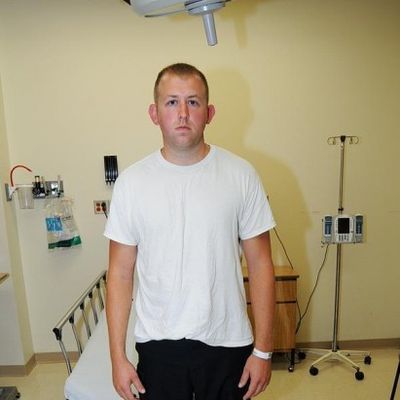
In anticipation of the first anniversary of the death of Michael Brown, The New Yorker has published a long profile of Darren Wilson, the former Ferguson, Missouri, cop who shot the unarmed black 18-year-old, setting off months of protests and an ongoing discussion about racial bias in America’s police force. The article, authored by Jake Halpern, includes the second interview ever granted by Wilson. (Wilson sat down with George Stephanopoulos in late November of last year, just one day after a grand jury declined to indict him in Brown’s killing.) Wilson still lives in the St. Louis area with his wife (also a former Ferguson officer), their baby daughter, and two stepsons. The family’s home was purchased with the “nearly half a million dollars” supporters donated to Wilson in the wake of the shooting.
The piece delves into Wilson’s troubled childhood, which was marked by his mother’s compulsive theft from friends and family (including “funds that she had helped raise for his Boy Scout troop”), debt, and possible suicide. But when asked to “[reflect] on what kind of person Brown was,” Wilson dismissed the teen thus: “Do I think about who he was as a person? Not really, because it doesn’t matter at this point. Do I think he had the best upbringing? No. Not at all.”
Wilson seems to have applied the same attitude to the rest of the predominantly black community he policed:
Several times, Wilson recalled, he responded to calls about gunfire in the woman’s neighborhood and saw “people running either from or to that house.” Wilson would give chase. “It’s midnight, and you’re running through back yards.” If he caught the kids, he checked them for weapons, then questioned them. He recounted a typical exchange: “ ‘Why you running?’ ‘Because I’m afraid of getting caught.’ ‘Well, what are you afraid of getting caught for?’ ‘I don’t know.’ ‘Well, there’s a reason you ran, and there’s a reason you don’t want to get caught. What’s going on?’ ” Wilson said that he rarely got answers—and that any contraband had already been thrown away. Once, he arrested some of the woman’s kids, for damaging property, but usually he let them go. In his telling, there was no reaching the blind woman’s kids: “They ran all over the mom. They didn’t respect her, so why would they respect me?” He added, “They’re so wrapped up in a different culture than—what I’m trying to say is, the right culture, the better one to pick from.”
This sounded like racial code language. I pressed him: what did he mean by “a different culture”? Wilson struggled to respond. He said that he meant “pre-gang culture, where you are just running in the streets—not worried about working in the morning, just worried about your immediate gratification.” He added, “It is the same younger culture that is everywhere in the inner cities.”
Wilson also seems to believe that the area’s long history of racist policing wasn’t fair justification for the black population’s distrust of the cops:
He granted that, in North County, the overt racism of past decades affected “elders” who lived through that time. “People who experienced that, and were mistreated, have a legitimate claim,” he told me. “Other people don’t.” I asked him if he thought that young people in North County and elsewhere used this legacy as an excuse. “I think so,” he replied.
“I am really simple in the way that I look at life,” Wilson said. “What happened to my great-grandfather is not happening to me. I can’t base my actions off what happened to him.” Wilson said that police officers didn’t have the luxury of dwelling on the past. “We can’t fix in thirty minutes what happened thirty years ago,” he said. “We have to fix what’s happening now. That’s my job as a police officer. I’m not going to delve into people’s life-long history and figure out why they’re feeling a certain way, in a certain moment.” He added, “I’m not a psychologist.”
Still, Wilson insisted that race didn’t play a major role in how he did his job: “Everyone is so quick to jump on race. It’s not a race issue.” Asked about the March Justice Department report detailing the Ferguson Police Department’s systematic abuse of black people, Wilson called the findings “skewed.” “You can make those numbers fit whatever agenda you want,” he said. As for his own agenda, Wilson told Halpern that he now avoids what he called “mixing [pots].” “We try to go somewhere—how do I say this correctly?—with like-minded individuals,” he explained. Read the entire story here.





























